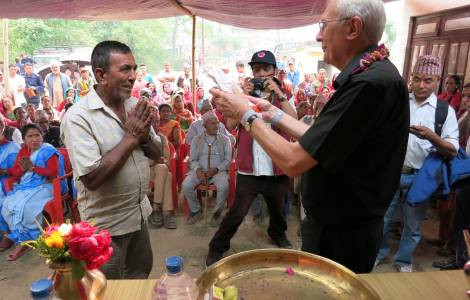
Kathmandu (Agenzia Fides) - In a tragic event like an earthquake, God's grace is not lacking: this is what emerges from the context of Nepal where, after the 2015 earthquake, faith in the people of God has strengthened: "The earthquake was horrible and scary. But in the tragedy we prayed consistently, we launched an effort of solidarity and received help from different parts of the world. In this way, gradually, they helped us to rebuild our lives and means of livelihood. We have experienced resilience, patience and optimism, hope and courage, even in a painful experience. Our faith is stronger than ever", says a Nepalese Catholic woman called Uttara to Fides.
"The earthquake has not weakened the love and solidarity of Christians and non-Christians. The help received from people all over the world really moved us. We were touched to see so much love and compassion towards us: this helped us to realize God's mercy in our lives", adds another Christian, Babita, speaking to Fides.
Many Nepalese men and women, Christians (Christians in the country are only 1.4% of the population, of whom 8,000 Catholics, out of 30 million Hindu residents) express the same concept and tell Fides that the dramatic event of the earthquake has helped to strengthen their faith in God and to experience the spirit of solidarity concretely. Civil institutions, government, NGOs, international organizations, religious communities such as the Catholic Church through Caritas co-operated during the emergency phase, assistance and reconstruction.
Two years have passed since April 25, 2015, when a 7.8 magnitude earthquake struck Nepal. Over 8,500 people died, more than half a million homes were destroyed, more than five million people in some way were affected by the effects of the earthquake: this is considered the worst natural disaster in the country's history.
Among the Catholic organizations, Caritas India and Nepal and the Caritas of other Western countries have been largely involved in work of rehabilitation, in rebuilding homes with criteria and anti-seismic materials, in projects for the support and development of the affected people.
Two years after the earthquake, many families have moved to new homes, referred "Cafod" (Caritas of the United Kingdom), explaining that "humanitarian response includes support to local partners to organize professional training laboratories with people from communities that were hit, in order to build safer homes, able to withstand earthquake shocks".
The women, Cafod notes, disproportionately suffered the impact of the earthquake and for this reason, the educational and professional projects started are a "lifeline for them". There are also programs to rebuild schools, water systems, and farms. Caritas, with all its partners and agencies from various countries, is still committed to projects and initiatives aimed at restoring the dignity of affected people and helping survivors to rebuild a prosperous future. (SD-PA) (Agenzia Fides, 5/7/2017)
 ASIA/VIETNAM - Vietnamese Catholic communities stand alongside women in need to combat mass abortion
ASIA/VIETNAM - Vietnamese Catholic communities stand alongside women in need to combat mass abortion